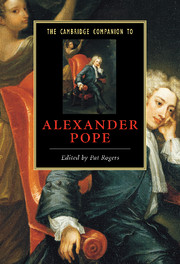Book contents
- Frontmatter
- Introduction
- 1 Pope, self, and world
- 2 Pope’s friends and enemies: fighting with shadows
- 3 Pope’s versification and voice
- 4 Poetic spaces
- 5 Pope’s Homer and his poetic career
- 6 Pope and the classics
- 7 Pope and the Elizabethans
- 8 Pope in Arcadia: pastoral and its dissolution
- 9 Pope and ideology
- 10 Pope and the poetry of opposition
- 11 Crime and punishment
- 12 Landscapes and estates
- 13 Money
- 14 Pope and the book trade
- 15 Pope and gender
- 16 Medicine and the body
- 17 Pope and the other
- Further reading
- Index
13 - Money
Published online by Cambridge University Press: 28 April 2008
- Frontmatter
- Introduction
- 1 Pope, self, and world
- 2 Pope’s friends and enemies: fighting with shadows
- 3 Pope’s versification and voice
- 4 Poetic spaces
- 5 Pope’s Homer and his poetic career
- 6 Pope and the classics
- 7 Pope and the Elizabethans
- 8 Pope in Arcadia: pastoral and its dissolution
- 9 Pope and ideology
- 10 Pope and the poetry of opposition
- 11 Crime and punishment
- 12 Landscapes and estates
- 13 Money
- 14 Pope and the book trade
- 15 Pope and gender
- 16 Medicine and the body
- 17 Pope and the other
- Further reading
- Index
Summary
When Alexander Pope recounts the onslaught of impecunious writers who seek him out at Twickenham, he describes their typical “modest wish” for “My Friendship, and a Prologue, and ten Pound” (TE, iv, p. 99). That triad of desires captures the basic types of currency in which Pope regularly traded: professional friendship, literary commodities or words, and, of course, money. Pope dwells on these currencies in Epistle to Arbuthnot (1735) because they define the symbolic system of investment and exchange that shapes his personal and professional relationships, his poetic career, and his financial activities. These three currencies are deeply imbricated and mutually reinforcing: as Pope's professional success increased, aided in part by an ad hoc system of patronage and his savvy determination to control the publication of his texts, his financial gains outstripped those of most of his poetic contemporaries. From the earliest stages of his career, Pope realized the value of ongoing relationships (sometimes collaborative, sometime adversarial) with his colleagues in the print trade: “A mutual commerce makes Poetry flourish” (Corr, i, p. 20). By skillfully deploying printed rejoinders, financial assistance, or well-placed advice, he contributed to his consistent “fame” in the marketplace and enhanced his ability to control the production and distribution of his own texts (and the attendant socio-poetic image). That control - which ranged from holding the copyrights to his poems to determining the quality of ink and paper and the appearance of the text on the page - simultaneously enriched Pope's poetic persona and his financial accounts.
- Type
- Chapter
- Information
- The Cambridge Companion to Alexander Pope , pp. 175 - 185Publisher: Cambridge University PressPrint publication year: 2007
- 1
- Cited by

